We live in a meritocracy – a merits-based world untainted by biases and personal prejudices.
So when VIDA decided to count the reviews in a number of important literary publications and discovered that male writers were up to 413% more likely to be reviewed than female writers in publications like The New York Review of Books, The Atlantic, Paris Review, The New Yorker, London Review of Books, Harper’s Magazine and others, we all knew, instinctively, that this could have nothing to do with what some insist on calling ‘unconscious gender bias‘. Sure, male and female writers publish about an equal number of books, but reviewers always review the best books available and the difference in the number of reviews is solely due to the merit of the books in question. (As one commenter noted, VIDA really needs to stop all this pointless counting and teach women how to write properly.)
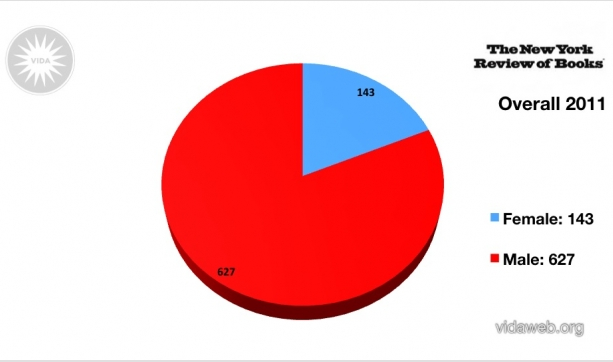
Let’s look at some facts: It took 109 years to have a female Australian Prime Minister, only 4 women in the US have become Supreme Court justices and no woman has been a US President solely because of lack of merit among women. And it isn’t just in the fields of writing, politics and justice where women lack ability – it took 82 years for a woman to win an Oscar for Best Director (Kathryn Bigelow, Hurt Locker, 2010) and in the UK’s National Gallery, out of 2,300 works, there are only 10 paintings by women because of lack of female artistic talent. Out of 573 listed statues commemorating important people around the UK, 15% are of women, with a large number of those being characters from Greek and Roman mythology, as there are so few real women who have done things. Further, 78% of front-page articles in the UK are written by men and 84% of those quoted or mentioned are male, and during 6 months of election coverage in the US, 81% of quotes about the issue of abortion were made by men because they were more qualified.
The facts are just staring us in the face – the majority of women simply lack merit in their opinions and career endeavours. It is an uncomfortable fact, but there it is. Forget that according the Australian Bureau of Statistics, more women than men aged 20-39 now have university qualifications, the fact remains that women naturally lack ambition and ability. This lack of merit is well documented, yet some people just don’t understand the beautiful meritocracy we live in.
For example, when Professor Eric Schliesser was invited to yet another philosophy conference with no female speakers, he decided he’d had enough. He teamed up with another male philosopher to issue a clarion call to men in the field who ‘through their inaction, complacency, and indifference contribute to the sexist status quo.’ They decided to boycott events where females were excluded. ‘We hereby commit ourselves not to accept invitations to male-only events,’ the pair wrote. Their boycott divided the philosophy community, and accusations of tokenism soon followed. Yet Dr. Schliesser rejected those accusations and characterised as ‘bogus’ the notion that gender equity jeopardizes a conference’s quality because unqualified women will be invited for the sake of it.
‘The tokenism argument is just insane for two reasons,’ Schliesser told The National Post this year. ‘A lot of the men that show up are in their own way tokens — they’re [an organizer’s] friend, they’re your supervisor, there are people that are over the hill, that show up drunk…And number two, there are, in fact, lots of very good female philosophers.”
He is wrong, of course. The first conference in Berlin that he boycotted had 14 male speakers because there were no women who had enough merit to be included. That Professor Eric Schliesser has ‘personally organized 45 successful gender-balanced conferences in five years’ only shows his pitiful lack of understanding of merit.
Those who argue that inequality still exists are ‘drama queens’ (Nicolle Flint, The Age, June 2012). Their claims are ‘playing the ‘woman’ card…hypocritical and unsubstantiated’, even downright ‘damaging to merit-based success’ (Flint again, The Age, Nov 2012). Those who bring up the issue of sexism are ‘playing the gender card‘.
Frankly, it’s privileged whining and Dr Schliesser should know better.
It should be – and further more it always is – about the best person for the job. Conscious or unconscious biases about gender, race, political leanings, religious beliefs and personal friendships and histories don’t enter into it.
Strangely, a paper was published recently in PNAS, examining the results of a randomised double-blind study where half of a group of scientists were given applications with a male name attached, and half were given the exact same application with a female name attached. ‘Results found that the “female” applicants were rated significantly lower than the “males” in competence, hireability, and whether the scientist would be willing to mentor the student.‘ The scientists also offered lower starting salaries to the female-named applicants. Apparently the scientists who judged the applications were both male and female, showing – the authors of the study claimed – that a bias against women exists in both genders.
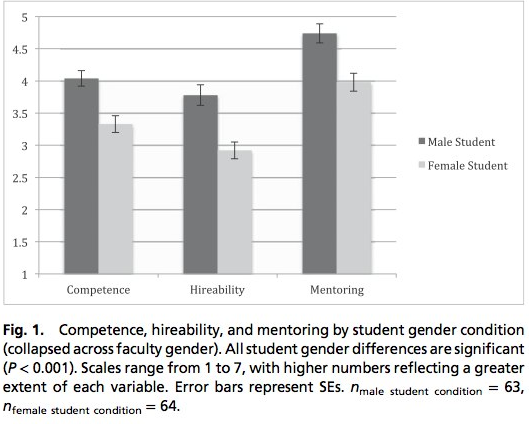
This study was obviously biased. Examining gender bias is an insult to our flawless meritocracy.
I for one wish these so-called scientists and philosophers and politicians and women’s groups would stop all their whinging about equal pay and the ‘sexist’ status quo. Organisations like The Stella Prize should wake up to all this whining they are doing and realise that they are threatening the harmony of our beautiful meritocracy with their questions about bias and their insistence on promoting the writings of women.
If an unconscious bias did exist – and obviously it doesn’t – it would surely be a complex issue affected by a number of things but gender would not, I repeat, NOT be one of them. Suggesting otherwise is just ‘playing the gender card’. (While I am on the subject, who keeps printing those darned gender cards?)
As Cameron Woodhead, a critic for The Age and Sydney Morning Herald laments, ‘The other thing that annoys me about the debate is the shrillness of it… I don’t think that the statistics gathered by the Stella people, which are being gathered specifically for the purpose of setting up a women’s only prize, can be considered conclusive or meaningful…’ (The Nose, June 2012).
Biases, unconscious or otherwise, never affect reviews, awards or by extension, careers. Like philosophers, scientists, politicians and supreme court judges, writers like myself live in a bias-free world.
For example, shortly after the fallout from one of my blog posts managed to inspire the headline ‘TARA MOSS VS THE ARTS CRITIC’ (The Hoopla, Oct 2011) one of my novels was reviewed by the very same arts critic – a man named Cameron Woodhead (see above) who had never previously, to my knowledge, read or reviewed any of my work. Naturally, the review, unflattering though it was, could only be described as unbiased. After 9 novels and 13 years in publishing I have seen many bad reviews of my work, in a number of languages. I know what bad reviews look like. (Mixed reviews and good ones, too, thankfully). That this particular reviewer, Mr Woodhead, spent part of another author’s book review, on the same page, comparing its terrible qualities to my inadequate command of the written word was purely business as usual.
The review came out after a blog post of mine where I foolishly posted some of the aforementioned stats and asked if we were all (men and women alike) perhaps giving some kind of subconscious preference to male writers. And if so, why? Then, in the words of Jane Sullivan at the Sydney Morning Herald, ‘Back came a message from [arts critic] Cameron Woodhead: “I don’t mean to rain on your parade but this is the kind of privileged whining that annoys the crap out of me,” he wrote.’
‘Oh-oh. And on he went and on Tara Moss went and on went a whole host of other passionate readers.’ (SMH, Jan 2012.) And ‘…it was on for young and old. There were dozens, if not hundreds, of comments’ (The Stella Prize, Oct 2011) but this ‘blog stoush’ between Cameron Woodhead and myself wasn’t, you know, a thing. (Well, The Age, SMH, Crikey, The Hoopla, The Stella Prize, The Nose, Mamamia, Sisters In Crime, Bookseller and Publisher and various other industry professionals thought it was. Woodhead’s term ‘privileged whining’ was bandied around a bit and the incident even started something called the Australian Women Writers Challenge.) So the same critic was, I’m sure, the most eligible and unbiased reviewer available to review my novel The Spider Goddess a couple of months after the incident. And though his actions were described as ‘trolling antics, sniping back to further comments made by Moss, claiming she had invented things he’d said like a child’ (Crikey, Oct 2011) and he had been ‘raked over the coals after commenting on a blog post by crime writer Tara Moss’ (The Nose, June 2012) he was, I’m sure, again the best and most unbiased critic available at Fairfax to review Assassin this weekend, where he spent approximately half of the available word count discussing a different book.
Perhaps, having never reviewed any of my work before, our rather public disagreement ignited a genuine, unbiased interest in every novel I have published since. After all, only a day after the blog stoush he did tweet: ‘I await your next novel with interest. I mean that.’
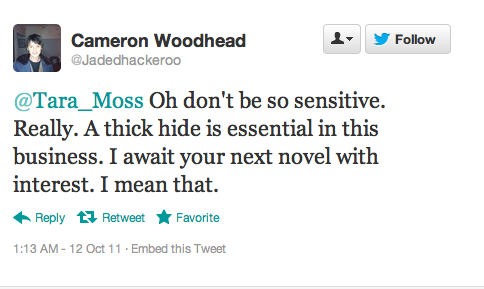
He meant it, obviously.
Because we must remember the undeniable fact of our beautiful literary meritocracy. Our total lack of bias in all matters must not be questioned. Suggesting anything else is privileged whining.
* This blog was originally published Nov 11, 2012. Here are some reactions:
‘Tara Moss mocks the flawless meritocracy of our society (hint: it’s not a flawless meritocracy)’ – Literarium.
‘This lady knows how to staple zingers to facts in a glorious sandwich of writership’ – Alice Fraser, comedian.
‘Eloquently put’ – Lisa Dempster, director of Melbourne Writers Festival, author of Neon Pilgrim.
‘Moss wrote a satirical blog post sending up the opinions of those who have criticised the creation of a women’s only literary prize…In her post, she adopts the posture of someone who believes a “meritocracy” of literary writing exists, and that this meritocracy explains the low number of reviews in literary journals of books by women which the VIDA count has identified. Her adopted persona is baffled by damning evidence…’ – Australian Women Writers Challenge.
‘Is Tara Moss guilty of ‘privileged whining’ when she raises, again this week, the question of gender balance and bias in literary pages?…Surely an internationally successful writer has the right, and some might say the obligation, to speak out on an issue that affects all writers, male and female. Because if literary reviewing, criticism and award giving were an actual level playing field, being lauded and awarded for writing a great book would be more meaningful, not less.’ – The Hoopla Literary Society.
‘Well said Tara!’ – Eva Cox, AO.
‘Excellent post by Tara Moss on the myth of ‘our beautiful meritocracy’ – Emily Maguire, author of Fishing for Tigers.
‘Persuasive, powerful discourse’ – writer Samantha Josephine.

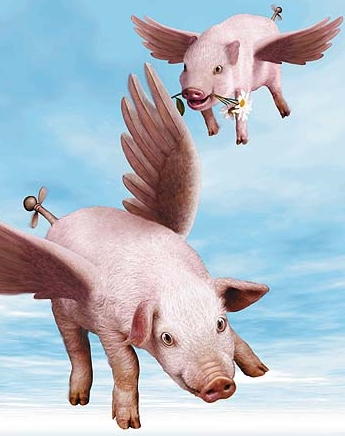
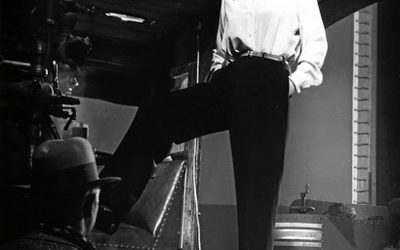

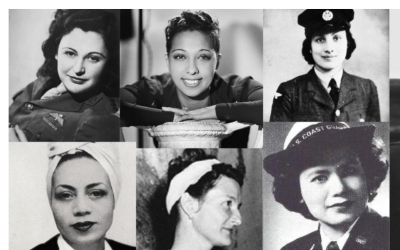
I’ll have another read of this shortly but just now I’m scheduled to feed Woodhead’s flying pigs.
The fact that Woodhead gets to review you merely highlights the lamentable drop in the number of people now getting to do reviews in mainstream media. I’m still with you, Tara!
Took a few seconds for me to detect a hint of sarcasm, Tara. (Hey it’s Sunday afternoon,) Love how you use words to make the reader think instead thinking for them. I’m definitely voting for the Meritocracy over the Media-ocracy.
I really enjoyed this, especially the bonus graphs (Facebook). I am saddened by the fact that the same old (oh so old!) arguments are being used in this discussion; e.g.the “shrillness” the “privileged whining” and “inviting women….for the sake of it”. As an older feminist, I find it bloody annoying.
I feel like Cameron Woodhead’s twitter hashtag; jaded. (@jadedhackeroo)
Thanks for this Tara – it’s nice to be given the data to back my assertions in arguments against those who tell me why ‘women just aren’t as funny’.
A friend and I just made a pact that we’ll name women at least as often as men when we’re on the scene and someone asks us for a recommendation or the name of a comedian who might be available for a show.
The ‘but we already have a/two female(s) on the bill’ is the other pervasive aesthetic. People seem to forget that it’s going to remain problematic until there are 51% of women on the bill.
Male-write-ocracy
I can’t believe it’s apparently a new word, inspired by this posting.
Alternative generic form for use well beyond the literary sphere:
Male-writ-ocracy
Mr Woodhead’s surname implies that his talents are genetic – from his father’s side!
Thank you, Tara. Thank you for the wit and the facts and the humour and most of all, thank you for the intelligence.
Tara. Hurrah for those speaking the stats. I too was reviewed by CW this year. In my Melbourne stage debut, a live-art piece I wrote/performed at the Tower, Malthouse, reviewed by Australian Stage as “original, intelligent, funny and feminist theatre!” And there’s the oh-oh.
‘Bild-Lilli’ is protest work, steeped in the history and tropes of feminist performance art. CW said there was no substance. No use going on with this superficial fluffery, he’d say. One can indeed detect in his review a dislike of something deemed uncomfortable, shrill. Public beware; nothing to see here. Do not buy [into] it, it has “nowhere to go”. No doubt if he reads this, he will tell me…again…something. Whatever. On I will go.
Critical reception to this show was, by the way, utterly split between: 2 other males who echoed – copied? – CW in phrasing, patronising tone and even structure (I must include the deliciously Freudian “this show has legs [but] its legs lead nowhere but an ineffectual wasteland of artless desolation”), and 2 females who were delighted by ‘Bild-Lilli’ and felt stimulated, challenged and refreshed. Tiny coincidence? Maybe. I mean, of course it’s a coincidence. Meaningless, probably.
Could one even f***ing think, in light of the stats women live with every single day, just some of which you’ve cited above, that you/we AREN’T thick skinned?
I think you overdid the point you were trying to make, and accidentally overdid Christopher Hitchens’ point about female comedians while you were at it.
I love all forms of literature to one to degree or another. I don’t think there’s a genuine gap in ability based on gender. I also don’t think your writing is particularly good. Lucky this is a meritocracy, really, or I’m sure I’d face unfair accusations of oestrophobia. We wouldn’t want people attacked for simply thinking crap things were crap, would we?
Tara – I have only read one (tiny) piece of your writing before, and not been interested in following it up. I am afraid that I probably inadvertently fell into a deplorable predjudiced assumption about the quality of your writing, based at least in part around your gender.
Please forgive me: as a white, educated male, I to tend to have lapses. But this? This is so fantastic, that I am now making one of your novels top of my Christmas list. And this article: Shared, tweeted, and re-posted.
Thank you.
Thanks Tara…well said…even if it is a bit ‘tongue in cheek’ biased against males?? (Just jokin’) :-}
If this hadn’t been rec’d to me by a close friend i would have stopped reading it after the 2nd paragraph. I had to read though to almost the last paragraph before i realised that it was sarcasm. At the beginning it really feels like your arguing the anti-feminist line.
I always marvel at how people comment when you highlight the reviews-argument. It is such an amazing example of gender bias, because the reviewed material is only being chosen either as a) a debut, or b) a new work by a previously published author. Meaning that what you have to go from s ONLY the person’s name, or previous mention of that person, or previous works. It can never have to do with the particular piece of art. It is only expectation, and these statistics show, very obviously, that the editors do not expect good things from female names. Should we again begin to publish our work under male pseudonym? Has it come to this.
As a happy reader and subscriber to the New York review, I am shocked that they can have such a lax stance on the importance of highlighting female artists.
I’m 21 years old, a victim of online sexual abuse, a feminist and, even though I live in Scandinavia, I feel like I am fighting a fight that is almost impossible to win.
A friend of mine of asian appearance read an article pointing to the fact that people with an asian name were the least likely to be picked for job interviews. Using her asian name she applied for a number of jobs and using an anglocised name she applied for the same number of jobs. And guess what? Got an interview for each of the jobs using her anglocised name and none with her chinese name. She got selected for two of these jobs. Seems there is a merit hierarchy in a name.
Thank you Tara for this brilliant and funny article, although rather depressing at the same time.
Keep that uncomfortable spotlight on the boys club which is firmly entrenched in many institutions.
It’s hard to believe it’s 2012 ?
Agree 100% Tara. At every conference I attend of Higher Education writing and literature communities, my similarly gender provocative papers receive the same outcries from both men and women. The notion that merit is not loaded is so naive. these best explosion of this supposedly discrimination-free word was by Australian academic, researcher and author Clare Burtin in the mid eighties, yet three decades on the the term still carries a false sense of authority and equity. Crap. I am sick of this. If the educated and literate of our Society are still blind to this concept what hope do we women writers, researchers, educators and mothers ever have of being taken seriously rather than be constantly positioned as ‘whingers’. The evidence is out there if journalists and commentators like this man from Fairfax bother to do their research prior to rushing into print.
This is the most amazing thing I’ve ever read, and EVERYONE should read this!
Brilliant and spot on! Thank you for writing and sharing. I wish everyone who said that the ‘battle of the sexes’ or of inequality or whatever has been won would simply open their eyes. We still have such a long way to go.
Have just listened to the panel on Feminism from the Sydney Writer’s Festival. I thought you were great, by the way Tara! My feeling is that there would be no need for this discussion if it really were a discussion which honoured the rules of reason and statistical analysis. I think we need to understand that the argument is an emotional one, and that emotion runs stronger than reason in most people – men and women. so I think the emotional issues need to be addressed. Unfortunately as long as there is the binary implied by the term feminism, discussion on gender equality is perceived as an us or them fight along female/male lines instead of what it is intended to be, which is a concern that all people have a fair go. I consider myself a feminist, but find the term itself is problematic because it suggests to some men a privileging of women over men (ie simply reversing the existing male power structure and putting women on top). Not too many men want to be stuck where women are now.
Hi Tara,
I just wanted to thank you for writing this piece, and for speaking out about gender inequality. As a young women, who naively believed she would never have to deal with this nonsense, the professional world has been a rude shock to me. The only thing we can do to combat this kind of crap is to do something about it. I am working away in my corner of the world. Thank you, again, for working in yours. I appreciate it.
– Sarah.
Bloody brilliant, Tara. I’ve never read a better rebuttal of all the crap people use to justify the gender imbalances staring them in the face every day. At least, I’ve never read a better rebuttal from a woman….
Young women training in surgery in Australia are being failed in their training for not agreeing to sex with male surgeons. Google Tan v Xenos and find out how an extraordinary young asian neurosurgeon has been refused work in the public sector in Australia even though she fought a successful legal battle against him.
The statistics get even scarier when you look at those PNAS results in the context of testing to see whether the subject meets some arbitrary threshold (to be hired, to be invited as a speaker, etc).
Looking at the competence result, an average score of 4 for males versus 3.3 for females doesn’t sound that bad, but imagine a threshold of say, 4.0, to qualify for some reward. That means 50% of ‘men’ would qualify, but the bar is more than 3 full standard deviations above the mean score for ‘women’, so only a fraction of a percent would qualify.
Even a tiny bias against females in on some arbitrary score has an effect that’s amplified hugely when that score is compared to a (high) threshold. The higher the ‘bar’ is set, the worse the discrimination effect is amplified…
Look, Tara, you should just stop writing. You are far too pretty and your breasts are too perky for you to have anything sensible to say.
That 10% of difference is probably because women are very competitive to other women.
From my experience in academia, men always help women more than men, and women do not like more women in their environment, especially younger, more attractive women.